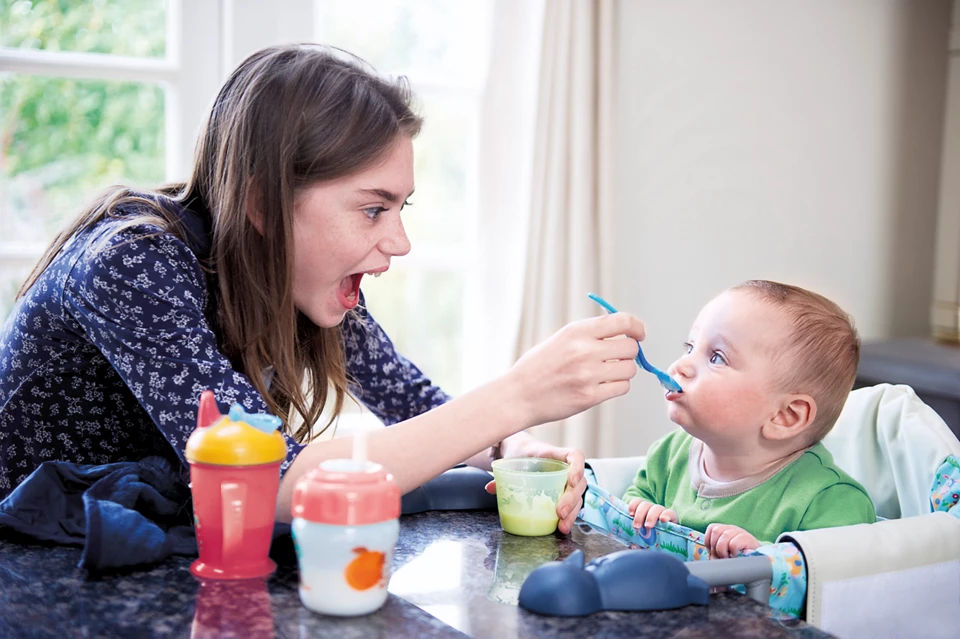Free weaning plan - Register here
My baby doesn’t seem to want to eat food, what can I do?
Taking food from a spoon is a whole new experience for your baby so it’s natural for them to be a little suspicious of this strange mushy stuff at first! The key is to let them lead the pace, however slow that may be.
Here are some tips for encouraging a reluctant eater:
• Choose a time when your baby is relaxed and alert and they’ve had time to ease into the day. Make sure you won’t be rushed so that you can both enjoy this new adventure together.
• If they don’t take a food the first time you offer it, don’t be put off. It can take several attempts for a baby to accept and enjoy a new taste. Just leave it for a while and offer it again another time.
• Praise your baby for eating well, and use gentle encouragement when they don’t.
• Turn off the TV, radio and move games and other distractions away from the eating area. A calm environment will help your baby focus on the job in hand.
• Offer your baby fingers of soft, cooked vegetables to feed themselves.
• Don’t worry if there are days when your baby eats less than usual. Their appetite will vary from day to day.
Is homemade baby food safe?
As long as you follow some simple hygiene rules when making it, homemade baby food is a great option! The reason for taking extra care is that their immune system is still developing and is more susceptible to infection.
• Always wash your hands before and after making food, taking extra care when handling raw meat.
• Always use separate knives, chopping boards and other utensils for preparing raw meat, fish, or fruit and vegetables.
• Clean any equipment used to prepare and serve your baby’s food before and after using it. Wash it thoroughly in hot soapy water, and wash your hands again afterwards.
Will my baby need less milk once they start solids?
At first, your baby will only be taking small amounts of food, if any! Milk will still be their main source of nutrients so you should keep giving them their normal amount throughout the day and night.
As they start to take more food, you’ll probably notice that they don’t want as much milk, because their appetite is being partially satisfied by the solids. Babies have a strong sense of what they need from their diet, so let them be your guide.
Your baby's usual milk, breastmilk or formula, should continue to be your baby’s main milk drink during their first year. You can also give them cooled, previously boiled water in hot weather or if they seem particularly thirsty.
What’s better – fruit or veg?
Recent studies have shown that the first foods we taste can shape our preferences later in life. So it makes sense that, if you want your baby to love healthy vegetables, it’s best to start weaning with vegetables. We’re born favouring sweet tastes so it’s easy to make them a key part of weaning – after all, babies love them! But by beginning with simple, single vegetable tastes, and not mixing them with sweet fruit flavours, you’ll be training their taste buds to recognise and appreciate the individual vegetable choices instead.
Fruit is still an important part of their diet, but give fruit separately from veg to help them distinguish sweet and savoury flavours.
Should I be careful with certain foods if we have family allergies?
Yes. If one or more of your baby’s immediate family has a food allergy, such as hayfever or food allergy, they have a higher chance of developing one too. The key is to start with the least allergenic foods, including baby rice, root vegetables and fruit. Foods that are more likely to trigger allergies, particularly cows’ milk, wheat, eggs, nut, seeds, fish and shellfish should be left until the later stages of weaning, and definitely not before 6 months. If you are worried, you could leave a gap of at least 3 days between introducing new foods as this will help you spot an allergy and identify which food has caused it.
The FSAI recommends that you don’t introduce foods containing gluten until at least 6 months. That means most breads, pasta and cereals that contain wheat, rye, oat and barley. When you do introduce it, start with small amounts and keep an eye out for any unusual changes in your baby.
Peanuts are a hot topic when it comes to allergies. If there are no allergies in your family, it’s ok to give your baby foods containing peanuts (finely ground, or in peanut butter) from the age of 6 months. If you do have a history of food allergies, you should speak to your GP before introducing any nuts. Whole and chopped nuts are only suitable after the age of 5, when your child can safely crunch and swallow them.
Is it ok to give my baby jar food every day?
There’s no doubt that cooking from scratch is the best way to feed your baby. Cow & Gate's jar meals are a healthy and convenient alternative. All Cow & Gate's baby food is made from baby grade ingredients and their recipes are cooked without a single artificial preservative, colouring or flavouring. They don’t add salt to any of their recipes either, except the small amount that’s found in cheese. Getting them used to a variety of tastes and textures, including fresh foods prepared in different ways, will help to reduce the risk of them becoming a fussy eater later on. And that will make everyone’s life easier – especially yours! If you have more questions about weaning, our advisors are happy to help.

Join the C&G baby club today
- Weekly emails with tips and advice for your stage
- 1-to-1 support from our dedicated Careline team, 8.30am - 5.30pm Monday to Friday.

Join the C&G baby club today
- Weekly emails with tips and advice for your stage
- 1-to-1 support from our dedicated Careline team, 8.30am - 5.30pm Monday to Friday.
More from baby
Baby topics
Need free advice with a smile? Get in touch with our dedicated Care team.
Ask us a question (8am - 8pm Monday to Friday, 10am - 4pm Weekends)
Messenger
Contact us on Facebook (10am - 10pm, 7 days a week)
Call us
Call us on 0800 977 8880 (8am - 8pm Monday to Friday)
FAQs
Get answers to your most frequently asked questions





